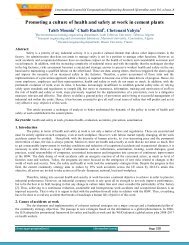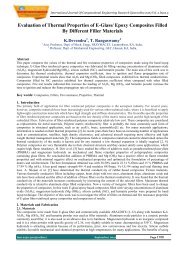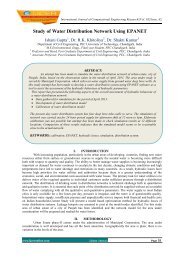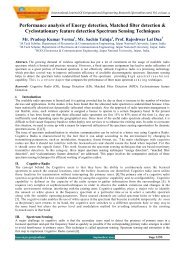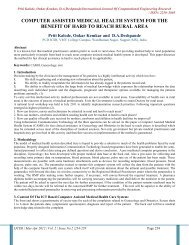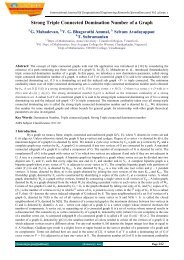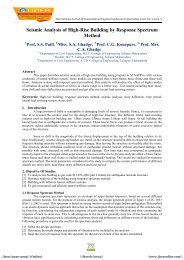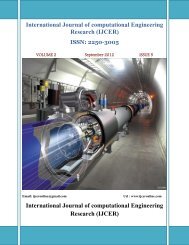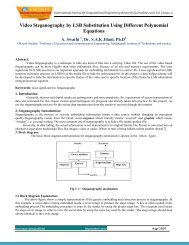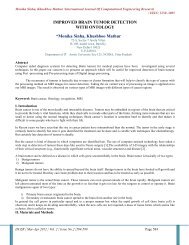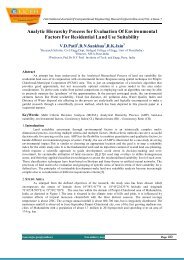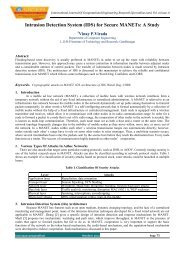ISSN: 2250-3005 - ijcer
ISSN: 2250-3005 - ijcer
ISSN: 2250-3005 - ijcer
Create successful ePaper yourself
Turn your PDF publications into a flip-book with our unique Google optimized e-Paper software.
International Journal Of Computational Engineering Research (<strong>ijcer</strong>online.com) Vol. 2 Issue. 8Adopting Trusted Third Party services for Multi-level Authenticationaccessing cloudVivekananth.P (1 st ) Dr.Ritish Khanna (2 nd )1Research ScholarDepartment of Computer ScienceCMJ University Shillong Meghalaya2Faculty Isara institute of management and professional studies DelhiAbstract:Cloud computing is an emerging, on-demand and internet-based technology. It provides variety of services overinternet such as, software, hardware, data storage and infrastructure. This technology has been used by worldwide customers toimprove their business performance. At present, authentication is done in several ways: such as, textual, graphical, bio-metric,3D password and third party authentication. The framework have seven processes, including: processes-selecting relevantcritical areas, strategy and planning, risk analysis, risk assessment, risk mitigation, assessing and monitoring program, and riskmanagement review. To develop the dynamic Trusted Third Party auditing key role of public auditability in the cloud storagesecurity API. The main objective of this research question is to understand information security threats relevant in cloudcomputing. Considering the security and efficiency in data sharing, we introduced the trusted third party (TTP). In this paperaims at identifying SLA based information security metrics relevant in cloud computing. In this research investigates differentObjects relevant in cloud policy models and each of them can be used as a component in the proposed framework. A rolerepresents a specific function within an organization and can be seen as a set of actions or responsibilities associated with thisfunction.Keywords— Secure Data collection, Cloud Storage Services, Secure distributed storage, Third Party Auditor, Insider Access,Service Level AgreementI IntroductionCloud services, which are deployed as self-contained components, are normally partial solutions that must becomposed to provide a single virtualized service to Cloud consumers. This composition of services should be carried out in adynamic and automated manner to promptly satisfy consumer requirements. Data storage correctness or some time moregenerally referred as data integrity verification is one of chief Cloud security problems [1]. Data can be altered by unauthorizedentity without intimating to data owner.Cloud Computing provides an optimal infrastructure to utilise and share both computational and data resources whilstallowing a pay-per-use model, useful to cost-effectively manage hardware investment or to maximise its utilisation. Cloudcomputing also offers transitory access to scalable amounts of computational resources, something that is particularly importantdue to the time and financial constraints of many user communities [2].Data storage correctness schemes can be classified into two categories (a) Without Trusted Third Party (TTP) and (b)with TTP, based on who makes the verification. In case of TTP, an extra Third Party Auditor (TPA), some time in form of extrahardware or cryptographic coprocessor is used. This hardware scheme provides better performance due to dedicated hardwarefor the auditing process but has some drawbacks such as single TTP resulting into bottleneck in the system, mutually agreeingon a common TTP where there are thousands of users across the globe. Due to such kind of reasons, we prefer an approachwhere the functionalities of TPA is integrated in form of client application and the application can be downloaded by cloud userfrom cloud server [3]. This client application provides all the cryptographic functionalities to achieve the goals of integrity,authentication and confidentiality. As this is a software approach, the performance of the overall system may not be comparableto dedicated hardware kind of TTP alternatives. To improve performance, we emphasize offline execution of computationallycostly cryptographic algorithms [4].The auditing community is aware that current practices for auditing cloud environments are inadequate. As compliancegrows in importance, enterprises implementing clouds need to satisfy their auditors‟ concerns; especially since creating anidentity for an individual virtual machine and tracking that virtual machine from creation to deletion creates challenges for eventhe most mature virtualized environments[5][6].||Issn <strong>2250</strong>-<strong>3005</strong>(online)|| ||December||2012|| Page 186



